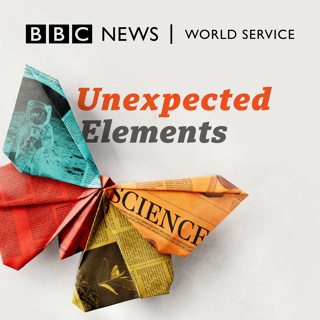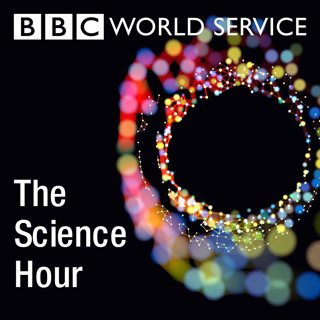
Don’t be a fool!
April 1st is notorious across the globe. Renowned for being a day of practical jokes. And it’s no different here on the BBC World Service. Mischievous elephants, the secret to fool's gold and one of the biggest scientific hoaxes in scientific history. From the Magic Circle to the Magic Lab, the psychology underpinning why we humans are so delightfully easy to trick with Professor Gustav Kuhn. And a question sent in from one of you: if two people eat the same thing for breakfast, does the same thing come out the other end of both of them? Prepare for a prank or two on Unexpected Elements. Or as they say in Finland, ‘Aprillia, syö silliä, juo kuravettä päälle’, which translates to ‘April trick, eat herring, drink muddy water afterwards!’ Presenters: Caroline Steel with Camilla Mota and Phillys Mwatee Producers: Harrison Lewis, Alice Lipscombe-Southwell, William Hornbrook and Imaan Moin
28 Mars 49min

What’s that smell?
Five years ago, people around the world were enduring COVID lockdowns as we attempted to prevent the spread of the virus. Today, many of those who caught COVID-19 are still suffering from lingering symptoms, including a loss of their sense of smell. And that got the Unexpected Elements team thinking about all things olfactory. First up, hold your noses as we investigate the two chemicals that make up the scent of death. Next, are you prone to telling lies? Well, research suggests that your nose might give you away!We then turn our attention to the cinema to find out more about the chemicals you release during a scary film. We’re also joined by chemist Professor Matija Strlic, who reveals how he can detect aromas in ancient Egyptian mummies and – crucially – tells us why he wants to do this. That, plus many more Unexpected Elements. Presenters: Marnie Chesterton, with Kai Kupferschmidt and Affelia Wibisono Producers: Alice Lipscombe-Southwell, with William Hornbrook, Debbie Kilbride, Imaan Moin and Noa Dowling
21 Mars 49min

The fast and the curious
It’s the month of Ramadan, when Muslims across the world fast between dawn and sunset in the belief that it will bring them closer to Allah. And this has inspired the Unexpected Elements team to turn their attention to all things fast.First, we explore the latest research around intermittent fasting.Next, we contemplate a new way to relax by harnessing the time-distorting power of black holes.We then find out why deserts in South Africa are spreading at an alarming rate.Plus, we’re joined by Dr Claire Lee, a particle physicist who works with the Large Hadron Collider at CERN. She explains how she and her colleagues accelerate particles to phenomenal speeds, how they detect these particles when they collide, and what this can tell us about the origins of the universe.That, plus many more Unexpected Elements. Presenters: Marnie Chesterton, with Tristan Ahtone and Leonie Joubert. Producers: William Hornbrook, with Alice Lipscombe-Southwell, Harrison Lewis, Debbie Kilbride and Noa Dowling.
14 Mars 49min

Silent science
Sparked by a silent album released by 1,000 musicians in protest of the UK government’s planned changes to copyright law, Unexpected Elements hits the pause button... Is there any science to silence?Fear not, this week’s show is packed full of chatter! You might think there’s only one type of silence, but supposedly exists in political science too. In fact, there are seven distinct types.If you're a techy you probably have a pair of noise cancelling headphones. But have you ever wondered how they work? We’ll take them apart to figure out how they work. Plus, dive into the fascinating world of gene silencing, definitely one of the coolest areas of genetics. Learn how this cutting-edge technology could help protect our crops from pests in the future.Later, Caroline is joined by her two wonderful panellists to contemplate and reflect on silence, when might it be harmful? And does true silence even exist?All that and many more Unexpected Elements.Presenters: Caroline Steel, Candice Bailey and Kai KupferschmidtProducers: Harrison Lewis, with William Hornbrook, Debbie Kilbride and Noa Dowling
7 Mars 49min

Topsy turvy
Unexpected Elements has a shake up looking into the topsy turvy world of science, all thanks to an upturned campervan in Western France.Explore why scientists are suspending rhinos from cranes, brace yourself for a quirky elementary particle that is hard to get your head around and if you love getting yourself in a tizz then fasten your seatbelts to meet one of the scientists responsible for curating the perfect theme park thrills. Professor Brendan Walker is sure to inject a scientific rush that will make you question who you take on your next roller coaster ride.Crack open the World Service archives to delve into the curious world of cryonics, exploring the science behind preserving bodies in suspended animation.And, have you wondered what your favourite music genre says about you? We uncover the surprising psychology behind your musical tastes.Presenters: Caroline Steele, with Andrada Fiscutean and Phillys Mwatee. Producers: Harrison Lewis, with William Hornbrook, Debbie Kilbride and Noa Dowling
28 Feb 49min

Standing on the shoulders of giants
Monty the giant schnauzer won best in show at the Westminster Kennel Club Dog Show. And rather than thinking of all things canine, this week the Unexpected Elements team turn their attention to all things giant. First, we find out how a giant virus could help keep our planet cool. Next up, we discover the origins of enormous Greek characters, such as the Titans and the Cyclops. We then find out how giant clams put solar panels to shame. Plus, we’re joined by Professor Shinobu Ishigaki, director of the Museum of Dinosaur Research at the Okayama University of Science. He tells us about the ginormous footprints he found in the Gobi Desert, and what they could teach us about herbivorous dinosaurs. That, plus many more Unexpected Elements. Presenters: Caroline Steel, with Chhavi Sachdev and Camilla Mota. Producers: William Hornbrook, with Alice Lipscombe-Southwell, Debbie Kilbride, Imaan Moin and Noa Dowling.
21 Feb 49min

Let’s talk about love
Valentine’s Day is here - the one day of the year where you can be unashamedly romantic and splash out on posh dinners, flowers and chocolates for your beloved. So we dig into the science of love. First, we find out about a monogamous rodent that has a special way of forming lifelong bonds with its partner. Next, we discover how to apply maths to your love life, before delving into the technology behind AI chatbots, and find out if a new dating app can help shine a light on the science of compatibility. Plus, we are joined by Bianca Acevedo, a research scientist at the University of California, Santa Barbara, who studies the neuroscience of love. She reveals what’s going on in our brains when we are infatuated with someone and what purpose love serves. Presenters: Marnie Chesterton, with Tristan Ahtone and Edd Gent Producers: Alice Lipscombe-Southwell, William Hornbrook, Debbie Kilbride, Imaan Moin and Noa Dowling
14 Feb 49min

All by myself
French president Emmanuel Macron recently announced that Leonardo da Vinci’s famous Mona Lisa painting will be moved to her very own room at the Louvre, as part of a plan to renovate the iconic museum.And that got us thinking. Once the crowds have gone home every night, the Mona Lisa will be all by herself, with no other paintings to smile at enigmatically across the room.So this week, we are talking all things isolation. We start things off by finding out about a key cognitive skill that may have been impacted by COVID-19 lockdowns.Next, we discover more about the history of loneliness and the impact it can have on your health, before discussing what evolutionary roads isolated island species will go down.Plus, we’re joined by Professor Jonathan Harrington from the University of Munich. He reveals how our accents can be affected by isolation. That, plus many more Unexpected Elements.Presenters: Marnie Chesterton, with Christine Yohannes and Affelia Wibisono. Producers: Alice Lipscombe-Southwell, with Dan Welsh, William Hornbrook and Imaan Moin.
7 Feb 49min





















